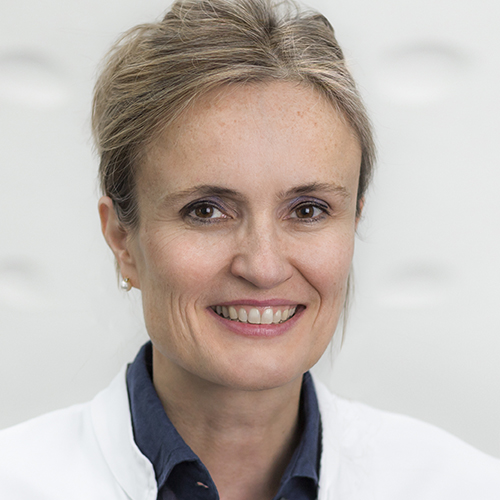
- This event has passed.
Sabine Eming (virtual), Immunological checkpoints in wound healing and misregulated reparative responses
6 February 2024 | 17 h 00 min - 18 h 30 min

Dr. Sabine Eming is Professor of Dermatology at the University of Cologne. She received her MD and her training in Dermatology at the University of Cologne. She was research fellow at The Scripps Research Institute and Harvard Medical School.
Dr. Eming’s research interest has focused on the mechanisms how the skin senses damage and how these events translate into a regenerative response or disease. Her research team has extensively studied mechanisms of induction and regulation of the immune response during skin wound healing. Her findings aim to develop novel strategies for pharmacological interventions in pathological healing conditions associated with diabetes mellitus, inflammatory diseases or ageing. (More detailed description below).
Abstract
Poor wound healing and its consequences on health and morbidity are one of the major unresolved medical problems today. Therefore, pharmaceutical advances to boost endogenous regenerative responses and to prevent misregulated reparative responses as e.g. tissue fibrosis are milestones in medicine. Yet, any therapeutic intervention would have to be carefully designed to accommodate the spatial-temporal complexity of intercellular metabolic interactions in the wound environment and to prevent neoplastic growth.
Frequently, impaired wound healing is associated with immune dysfunction leading to prolonged inflammation and tissue damage with a spectrum of pathological outcomes. An ulcerative healing defect in barrier organs (e.g. chronic wounds in the skin, mucosa, or cornea) and the excessive formation of ECM with perturbed architecture leading to organ fibrosis (e.g. hypertrophic scarring of the skin, keloid formation, or scleroderma) represent extremes on this spectrum. The underlying molecular pathology is not resolved and requires deeper mechanistic investigation. Findings generated in the Eming group demonstrate that metabolic pathways in immune cells or stromal cells control the outcome of a tissue damage response and that metabolic dysbalance in these cell types provides an explanation for the spectrum of pathological repair phenotypes. Specifically, using a combination of gene-modified mouse models and transcriptome profiling, the Eming group showed that metabolic reprogramming in macrophages coordinates critical stage-specific repair processes during wound healing. These findings may unravel useful targets for therapeutic innovation, which will be presented and discussed.
More detailed description of research done in Eming’s group
The skin is constantly exposed to environmental stress factors such as injury, microbes, UV light and toxic substances. Therefore, by nature the skin is explicitly well furnished to restore tissue integrity and homeostasis following tissue damage. Cellular and molecular mechanisms that control tissue repair are complex and involve cell-cell and cell-matrix interactions directed by a network of soluble mediators. Furthermore, wound healing mechanisms are not unique to the tissue repair response. In fact, postnatal wound healing in part recapitulates processes in developmental biology and organogenesis. Signals controlling cell growth, migration and differentiation during tissue repair have also emerged as central mediators in cancer biology and other inflammatory disease processes.
Professor Eming leads a programme of work in tissue damage and repair that encompasses the range from basic structure-function analysis, through in vivo models, to human disease. The group is aiming at a deeper understanding on how the skin senses tissue damage and how these events translate into a regenerative response or disease. Our findings might provide the possibility to manipulate the healing response in order to readjust postnatal repair into regeneration and to develop novel strategies for pharmacological interventions in pathological healing conditions associated with diabetes mellitus, inflammatory diseases or ageing. In addition, we are interested to study the interrelation between tissue repair, mechanisms of cancer development and inflammatory skin diseases.
